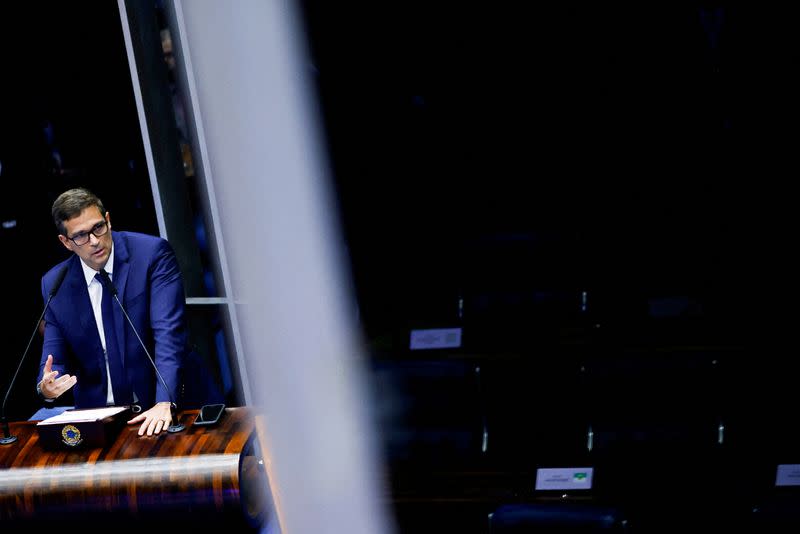Brazil's central bank chief says tight policy needed despite inflation easing

BRASILIA (Reuters) -Brazil's central bank chief emphasized the need to persevere in anchoring inflation to the official target during a hearing on Wednesday in Congress, where he faced questions about his personal investments and ties to the previous government.
Speaking to lower house lawmakers, Roberto Campos Neto noted that core inflation had been "falling a lot." The disinflation process is underway, but it still requires tight monetary policy, he added.
According to Campos Neto, mid-September inflation, which reached 5% on an annual basis, was significantly impacted by higher gasoline prices.
Before a meeting with President Luiz Inacio Lula da Silva later on Wednesday, the first between them since the leftist leader returned to power in January, he commended the government for its decision to maintain the inflation target at 3%, highlighting that it was a crucial step for the monetary easing cycle to begin.
Central bank policymakers have cut the benchmark interest rate by 50 basis points in each of the meetings this month and in August, bringing it down to 12.75% after holding it steady for nearly a year to tame high inflation.
The high borrowing costs had drawn sharp criticism from Lula, his political allies and members of the business community.
Campos Neto told the lawmakers it was important for the government to try to reach its new fiscal rules, which include eliminating Brazil's primary budget deficit by 2024. The central bank had emphasized that message in its most recent statement.
He said that markets will assess the efforts to meet these goals, even if they are not fully realized.
Economists are skeptical that the fiscal targets can be met, as they heavily rely on revenue increases, many of which are uncertain and contingent on congressional approval.
Campos Neto endorsed two of the government proposals to tax closed-end and offshore funds which currently enjoy tax advantages that benefit wealthier Brazilians.
The central bank chief said he backs a 10% tax rate for those adhering to the new rules this year, higher than the 6% proposed by some lawmakers.
Campos Neto himself holds offshore investments, which he said have always been disclosed in his public asset declarations and not been actively managed since he assumed his position in 2019 after being appointed by former President Jair Bolsonaro.
He was questioned about those investments by Lindbergh Farias, a lawmaker who serves as Lula's deputy leader in Congress.
Campos Neto added that he was expecting to discuss Brazil's better-than-expected economic growth during the hearing, highlighting the resilient labor market and favorable inflation performance, rather than delving into his own investments.
(Reporting by Marcela Ayres; Editing by Mark Porter and Paul Simao)

 Yahoo Finance
Yahoo Finance 